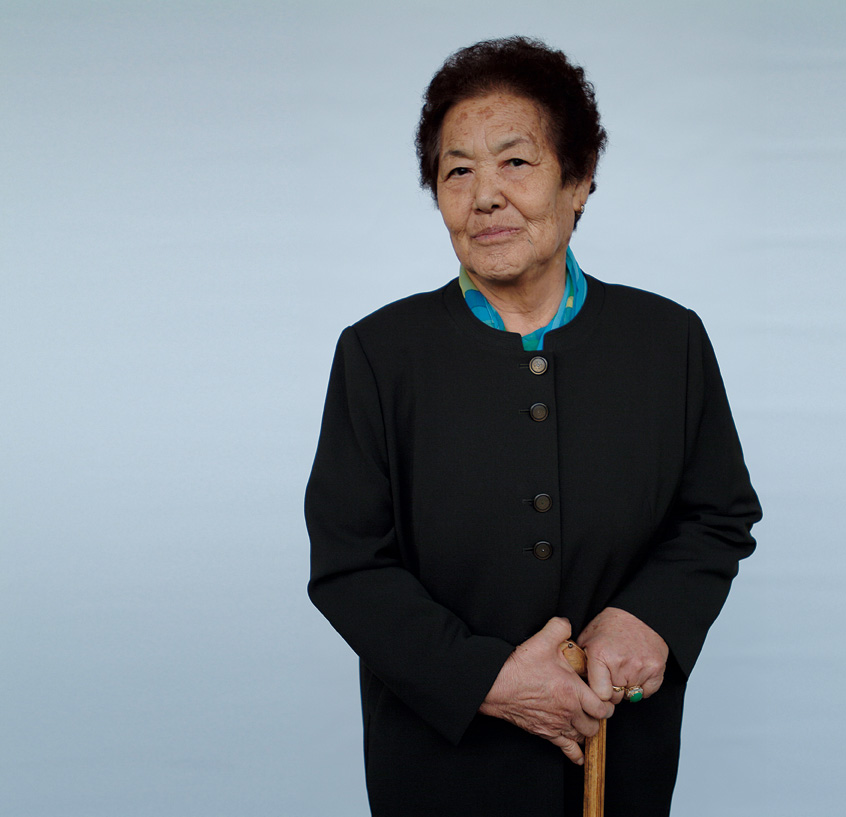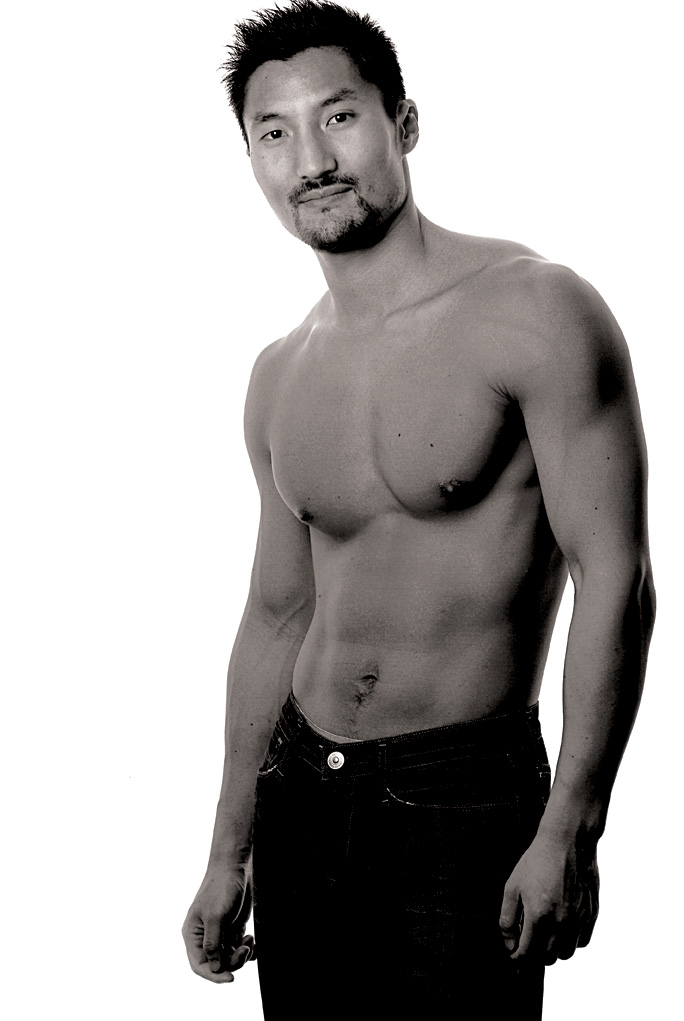By Michelle Woo
Photographs by Eric Sueyoshi
Bundled in coats and scarves, they chant in unison, their fists clenched toward the sky. They are some of the last remaining comfort women, those who endured rape and torture at the hands of Japanese soldiers during World War II.
Every Wednesday for the past 15 years, they demonstrate in front of the Japanese Embassy in Seoul, pleading for an apology that never comes.
Panning the scene with her video camera, filmmaker Hein Seok stands on the sidelines. Two years ago, the recent CalArts graduate and Fulbright award winner journeyed thousands of miles to South Korea to document the lives of former comfort women residing in what they call their final resting place.
Her harrowing documentary, “House of Sharing,” a project for her senior thesis, emerged just in time to help inspire change.
On Feb. 15, three survivors testified against Japan at a congressional hearing in Washington. A new resolution, which at press time had yet to be endorsed by the House, urges the Japanese government to “formally acknowledge, apologize and accept historical responsibility in a clear and unequivocal manner” for the mass brutalities. If passed, the resolution could grant the survivors their final wish.
Beginning in the 1930s, an estimated 200,000 girls were forced or tricked into sexual slavery by the Japanese military, some as young as 15. About 90 percent were from Korea.
Those who remain are now in their 80s and 90s. Through her lens, Seok shares their stories.
Nestled between lush trees in the outskirts of Seoul lies an unassuming establishment called the House of Sharing. The buildings include a historical museum, a temple and two brick dormitories, home to nine survivors. Founded in 1992, the mission of the House of Sharing is to educate the public on the past atrocities and to provide the former slaves with a safe, nurturing place to live.
When Seok was attending high school in Korea, she heard of villagers protesting the opening of the House of Sharing. They thought such a place would tarnish the image of the conservative community. Seok couldn’t understand why.
Her interest in the subject matter was further fueled in college as she leafed through dissertations, government documents and testimonies, trying to get a grasp on it all. She wanted to help, but didn’t know how.
In 2005, she was finally pushed into action when she heard about the passing of Soon-Duk Kim, one of the most well-known and vocal comfort women. She decided to turn her research and interest into a documentary, showing a real-life portrait of former comfort women in today’s world.
“Everyone is slowly disappearing,” says Seok, 29, who spent four months filming in Korea. “The problem is that people think that this is over. To the public, it’s past news.”
When Seok first met the survivors at the House of Sharing, she was taken by their warm personalities. She learned that they don’t like to be called comfort women, a euphemism created by the Japanese. They would rather be called halmeonis, the Korean word for grandmothers, a piercing detail since many could never bear children, due to shots to prevent venereal diseases.
Over the first few weeks, Seok became a welcomed addition to their surroundings. Each day, the women would wake up at about 6 a.m., eat breakfast and watch TV. Sometimes, they would sing songs or practice writing in Korean. Other times, they would take trips to the salon or go for acupuncture treatments.
They soon got used to the camera, and as grandmothers often do, rambled all sorts of advice.
“They would say, ‘You’re shooting wrong,’” Seok says. “It’s hard to describe their personalities because they’re all very different. Some are very quiet. Some are very outspoken. Some like to joke around. Some are a little more sad.”
Looking at their faces, wrinkled and genuine, it’s hard to imagine their tragic past.
But it still haunts them.
***
In the basement of the museum, there lies a full-scale replica of a typical comfort station. There, in the small wooden corridor, sits a single bed. At the entrance, a white sign displays the woman’s name and her price. According to Justice for Comfort Women, a grassroots coalition, women were divided into categories based on their “freshness,” with virgins in the top tier. Tickets were handed out as rewards.
Soldiers received condoms at the door, which they often did not use. If a woman protested, she would get beaten.
Seok says that when one of the survivors first saw the replica comfort station, her knees gave out and she had to sit. Then, she cried and cried. It was exactly what her comfort station looked like.
In the darkness, when the house is silent, a scream will come from one woman’s room. This one always sleeps with her light on, Seok explains. She often believes the soldiers are in her room.
They don’t bring up the past too often, Seok says, but when they do, it is usually done through forms of therapy.
Years back, they participated in art sessions, where they were able to spill their emotions through watercolors. The women would sit around the table and, with a paintbrush as their megaphone, illustrate history.
The finished pieces are haunting. Soon-Duk Kim’s shows a naked woman crouched on her knees, face down, as a line of soldiers walk past her in the night. Duk-Kyoung Kang’s shows a blindfolded soldier tied to a tree with three guns pointing directly at him.
The canvases are filled with symbols of pain and longing. Falling doves symbolize a sense of freedom and peace that vanished the moment they were abducted. Bold colors such as fire-red symbolize the rage that still swells inside them.
Seok says the women have learned to find solace in such small, everyday acts. But it is not enough. What they want, what they need, is an apology.
***
Koon-Ja Kim, 81, sits in a wheelchair in the front row of an old, half-full auditorium at the Korean Education Center in Los Angeles. Her hair is short and thinning. Her body is small. One by one, audience members walk up to her, crouch down and introduce themselves. She smiles and nods.
As part of her project, Seok arranged a tour titled, “As Long as I Live: The Testimony of a Former Sexual Slave for the Japanese Military.” Throughout the month of February, she traveled with Koon-Ja to various California universities and other educational centers, sharing their message through paintings, live testimonies and screenings of the documentary.
Survivors from the House of Sharing often take turns speaking about their experiences to audiences around the world. For a while, Kim was very sick, but when she got better, she told the assistant director at the house that she was ready to see something new.
This is her first time in America.
She slowly lifts her body out of her wheelchair and, with assistance, walks onto the stage. There is a youthful glow that emanates from her.
Holding onto a table for support, she bows to the audience and speaks with force. Her voice is raspy and bold.
“I am Koon-Ja,” a translator says, sitting off to the side. “I love you for coming. Please don’t make fun of me for doing these shameful things.”
She sits down.
“I was 17 and I had a boyfriend. We were about to get married but then I was abducted by the Japanese military. … I arrived on a Friday. On Saturday, when I woke up, the military soldiers were standing in my cube. They were angry and they would beat me, and I couldn’t make sense of it. I had 20 to 30 soldiers a day. Sometimes, I tried to die. I would try to hang myself. The soldiers saw the bruises on my neck and would beat me again. I cried every day.”
She says the soldiers made her pose in shameful ways. The women tried to escape, but the soldiers found out and laughed, saying, “Where could you possibly go?”
Kim says she became pregnant at the comfort stations, but her baby died of shock at 5 months old. When she returned to Korea after the war ended, she kept her story to herself because few people would believe her or understand.
A hand raises in the audience.
“What is your final wish?” a man asks in Korean.
Kim answers without hesitation.
“She wants an apology and official reparation,” the translator says.
Very soon, part of that wish may come true.
***
On Jan. 31, Representative Mike Honda (D-CA) introduced before the U.S. House of Representatives what is now the bipartisan House Resolution 121. The proposed resolution does not seek reparations, but demands that Japan formally reject those who say sexual enslavement never happened and educate younger generations about the comfort women’s experiences. Kim was one of the three women to testify at the hearing.
Honda noted that the purpose of this resolution is “not to bash or humiliate Japan,” but rather to achieve justice for the remaining survivors and “to shed light on a grave human rights violation that has remained unknown for so many years.”
Adrian Hong, an organizer with Justice for Comfort Women, feels confident that this time, the resolution will pass. In a message he e-mailed to numerous community groups and posted online, he gives background information on the matter and ways individuals can help.
“We can win. We will win. Time is running out,” the message reads.
“It’s really tragic that it has taken this long to do this,” Hong says. “Hundreds of thousands of women went through horrific things and (Japanese) history books claim that it didn’t happen.”
Similar efforts have been blocked by lobbyists for the Japanese government and those who believe that such a resolution would damage relations with Tokyo, Hong says.
In 1990, 37 women’s groups in Korea formed the Voluntary Service Corps Problem Resolution Council and demanded a public apology, a memorial, compensation and accurate facts in historical education. A year later, after the Japanese government denied its involvement in comfort stations, three former comfort women filed a lawsuit against the Japanese government, which was never resolved. Congressional legislation was also submitted in 2001 and 2005, but never made it past Japanese lobbying. And last year, a resolution similar to H.R. 121 was passed by the House Foreign Affairs Committee, but the Republicans, who then controlled Congress, never brought it before the full House for action.
Japan says its leaders have apologized. In a letter sent in 2001 to the comfort women, the former prime minister wrote he felt sincere remorse for their “immeasurable and painful experiences.” In the mid-90s, an Asian Women’s Fund paid some comfort women $20,000 each.
But Seok says it is not enough. The women want a formal apology from the Japanese government. And although she believes H.R. 121 misses a major point — reparation — it is something that would bring them one step closer to finding a sense of peace.
“There is nothing that will undo what they went through,” Seok says. “This is about getting some closure.”







